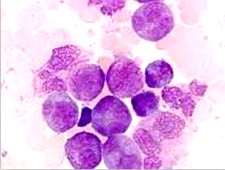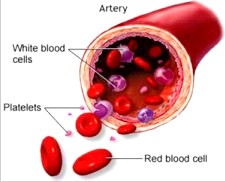| |
 |
|
|
|
|
|
|
Leukemia |
|
|
What is Leukemia ?
Leukemia is a form of cancer that begins in the
blood-forming cells of the bone marrow—the soft, inner part of the
bones. Leukemia, which literally means "white blood" in Greek,
occurs when there is an excess of abnormal white blood cells in
the blood. Known as leukocytes, these cells are so plentiful in
some patients that the blood actually has a whitish tinge.
Under normal circumstances, the blood-forming (hematopoietic)
cells of the bone marrow make leukocytes to defend the body
against infectious organisms, such as viruses and bacteria. If
some leukocytes are damaged and remain in an immature form, they
become poor infection fighters that multiply excessively and do
not die off as they should.
These damaged leukemic cells accumulate and lessen the production
of oxygen-carrying red blood cells (erythrocytes), blood-clotting
cells (platelets), and normal leukocytes. If untreated, these
leukemic cells overwhelm the bone marrow, enter the bloodstream,
and eventually invade other parts of the body, such as the lymph
nodes, spleen, liver, and central nervous system (brain, spinal
cord). In this way, the behavior of leukemia is different than
that of other cancers, which usually begin in major organs and
ultimately spread to the bone marrow.
There are more than a dozen varieties of leukemia, but the
following 4 types are the most common:
- Acute myelogenous leukemia (AML)
- Chronic myelogenous leukemia (CML)
- Acute lymphocytic leukemia (ALL)
- Chronic lymphocytic leukemia (CLL)
Acute leukemias usually develop
suddenly, whereas some chronic types may exist for years before
they are diagnosed.
Leukemia Signs and
Symptoms
In many cases, the first signs and symptoms of leukemia are
nonspecific (vague). Early signs also may occur with other types
of cancer or with other medical conditions. Although leukemia
signs and symptoms vary depending on the type of disease, there
are some general features. Broad symptoms of leukemia include the
following:
- Fatigue
- Malaise (vague feeling of bodily discomfort)
- Abnormal bleeding
- Excessive bruising
- Weakness
- Reduced exercise tolerance
- Weight loss
- Bone or joint pain
- Infection and fever
- Abdominal pain or "fullness"
- Enlarged spleen, lymph nodes, and liver
Chronic leukemia often goes
undetected for many years and may be identified in a routine blood
test. In fact, nearly one in five chronic leukemia patients do not
report symptoms at the time of diagnosis. Most symptoms of acute
leukemia are caused by low levels of normal blood cells, which is
due to overcrowding of the blood-forming bone marrow by leukemia
cells.
Leukemia Treatment
Leukemia is not a single disease. Instead, the term leukemia
refers to a number of related cancers that start in the
blood-forming cells of the bone marrow. There are both acute and
chronic forms of leukemia, each with many subtypes that vary in
their response to treatment. In addition, children with leukemia
have special needs that are best met by care in pediatric cancer
centers. Such centers have trained medical professionals whose
sole purpose is to address the unique concerns of children.
Leukemia treatment plans often are personalized and geared toward
each individual patient. In general, there are five major
approaches to the treatment of leukemia:
1. chemotherapy to kill leukemia cells using strong anti-cancer
drugs;
2. interferon therapy to slow the reproduction of leukemia cells
and promote the immune
system's anti-leukemia activity;
3. radiation therapy to kill cancer cells by exposure to
high-energy radiation;
4. stem cell transplantation (SCT) to enable treatment with high
doses of chemotherapy
and radiation therapy; and
5. surgery to remove an enlarged spleen or to install a venous
access device (large plastic
tube) to give medications and withdraw blood samples.
Oncologists administer these treatments in a variety of
combinations. Each method has its advantages and drawbacks. It
usually is worthwhile to get a second opinion about treatment
before entering into a specific program; in some instances, a
second opinion may be required by the patient's insurance company.
For example, stem cell transplantation (SCT) is very costly and
entails a long stay in the hospital. Some insurance companies
still consider this to be an "experimental" procedure and will not
pay for SCT-related expenses.
The treatment of leukemia depends on a number of factors. The most
important of these are the histopathologic (diseased tissue) type
of leukemia, its stage, and certain prognostic features, such as
the patient's age and overall health.
|
|
|
|
Leukemia - treatment of Leukemia, Leukemia
types, Disease medicines, Leukemia symptoms, Leukemia and Disease symptoms,
Leukemia symptoms Disease and diagnosis, Symptoms and Solutions, Signs and
Symptoms, type of Leukemia, cause common, common Leukemia, Leukemia List,
causes list, Infectious Leukemia, Causes, Diseases , Types, Prevention,
Treatment and Facts, Leukemia information, Leukemia: Definition, Leukemia
names, medical Leukemia, medical Leukemia and disorders, cell Leukemia,
Leukemia Worldwide, Leukemia Research, Leukemia Control, Leukemia Center,
Digestive Leukemia Week, Information about Leukemia, causes of different
Leukemia, Leukemia Articles, Leukemia and conditions, Health and Leukemia,
Leukemia Patients, Leukemia and Sciences, causes of alzheimer's Leukemia,
Leukemia causes, alternative medicine heart Leukemia, body ailments,
Leukemia medicines, medical antiques, type of blood Leukemia |
|
|





